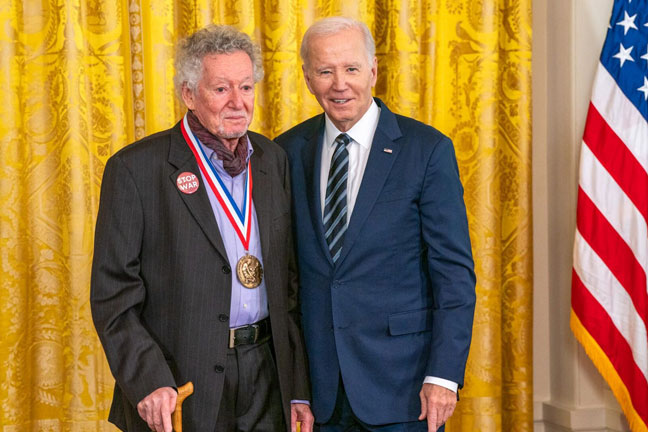October 26, 2023
Weinbaum was honored by President Joe Biden at a White House ceremony on Oct. 24
Rensselaer Polytechnic Institute has announced that President Joe Biden has bestowed the National Medal of Science on Sheldon Weinbaum, professor emeritus in the City College of New York’s Grove School of Engineering. The award is the highest honor for scientific achievement bestowed by the United States government. Weinbaum, a globally recognized biomechanical engineer, is a member of the RPI Class of 1959. The award recognizes individuals deserving of special recognition for their outstanding cumulative contributions to knowledge in the physical, biological, mathematical, engineering, or behavioral or social sciences, in service to the nation.
“We are enormously proud of Dr. Weinbaum’s achievements,” said Rensselaer President Marty Schmidt. “The National Medal of Science is a crowning honor for such a tremendous giant of biomedical engineering. The work he has pioneered has saved countless lives around the world. Beyond that, he has long been a staunch advocate for women and underrepresented groups in science and engineering careers. We at RPI are delighted President Biden has chosen him for this great honor.”
President Biden said that Weinbaum was chosen for his “pathbreaking research in biomechanics. His models have driven innovation in physiology, bone biology, and blood flow, increasing our understanding of cardiovascular disease and leading to lifesaving treatments. His exceptional teaching and mentorship underscore his lifelong advocacy for diversity and inclusion, tapping into the full talents of our nation.”
A prolific researcher with more than 200 published papers, Weinbaum was instrumental in establishing The City College of New York’s Department of Biomedical Engineering and the New York Center for Biomedical Engineering, a research consortium with eight area hospitals and other institutions. The department in 2001 received a five-year, $2.5 million grant from the National Heart, Lung and Blood Institute of the National Institutes of Health (NIH) to create a “national urban model for minority biomedical engineering education.” The grant was renewed in 2006 for five additional years.
Along with his pioneering work in the development of heat and mass transfer in biological systems, Weinbaum’s recent investigations include fluid dynamic and transport aspects of arterial disease, bioheat transfer, cellular mechanisms for mechanotransduction, bone fluid flow, microcirculatory exchange, transport in kidney proximal tubule, basic fluid mechanics, and porous media flow.
Weinbaum is one of only a handful of living Americans elected to all three U.S. National Academies: Science, Engineering, and Medicine. His other honors include a Guggenheim Fellowship in 2002, the American Society of Mechanical Engineers’ H.R. Lissner Award in 1994 and Melville Medal in 1996, and a National Science Foundation (NSF) “Special Creativity Award” in 1985.
Outside the research arena, Weinbaum has devoted his career to advocacy for equality of access in public higher education.
After receiving his bachelor’s degree in aerospace engineering from Rensselaer in 1959, Weinbaum went on to earn his master’s degree in applied physics and doctorate in engineering from Harvard University in 1960 and 1963, respectively. He joined the faculty of The City College of New York in 1967.


